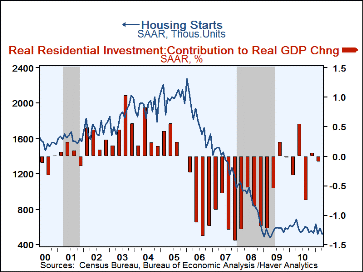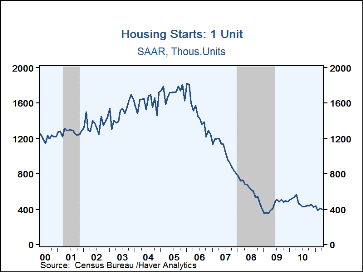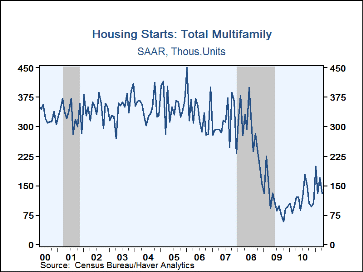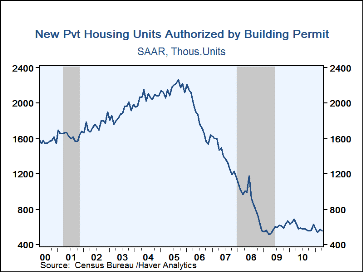 Global| May 17 2011
Global| May 17 2011U.S. Housing Starts Decline Unexpectedly
by:Tom Moeller
|in:Economy in Brief
Summary
There's still no forward momentum behind housing sector activity. Housing starts fell 10.6% to 523,000 units last month after a revised 12.9% March gain to 585,000, initially reported as 549,000. The latest figure was the lowest in [...]
There's still no forward momentum behind housing sector activity. Housing starts fell 10.6% to 523,000 units last month after a revised 12.9% March gain to 585,000, initially reported as 549,000. The latest figure was the lowest in exactly two years and compared to Consensus expectations for 570,000 starts.
Weakness in building was most significant in the single-family area where starts fell 5.1% to the lowest level since April 2009. More pronounced was the 24.1% drop (+6.6% y/y) in multi-family starts but these still were more-than double the October 2009 low. Starts of 2-to-4 units building jumped by more than one-third m/m (15.4% y/y) but starts of larger buildings with 5 or more units fell by more than one-quarter (+5.6% y/y).
Building permits also fell a sharp 4.0% (12.8% y/y). Single-family permits fell 1.8% (-18.6% y/y) while multi-family permits were off 8.8% (+4.4% y/y).
The housing starts figures can be found in Haver's USECON database. The expectations figure is contained in the AS1REPNA database.
| Housing Starts (000s, SAAR) | Apr | Mar | Feb | Apr Y/Y | 2010 | 2009 | 2008 |
|---|---|---|---|---|---|---|---|
| Total | 523 | 585 | 518 | -23.9% | 585 | 554 | 900 |
| Single-Family | 394 | 415 | 388 | -30.4 | 471 | 442 | 616 |
| Multi-Family | 129 | 170 | 130 | 6.6 | 114 | 112 | 284 |
| Starts By Region | |||||||
| Northeast | 60 | 63 | 55 | -29.4 | 72 | 61 | 120 |
| Midwest | 96 | 83 | 63 | -19.3 | 98 | 95 | 134 |
| South | 255 | 331 | 310 | -31.8 | 296 | 281 | 451 |
| West | 112 | 108 | 90 | 2.8 | 120 | 117 | 195 |
| Building Permits | 551 | 574 | 534 | -12.8 | 603 | 582 | 896 |
Tom Moeller
AuthorMore in Author Profile »Prior to joining Haver Analytics in 2000, Mr. Moeller worked as the Economist at Chancellor Capital Management from 1985 to 1999. There, he developed comprehensive economic forecasts and interpreted economic data for equity and fixed income portfolio managers. Also at Chancellor, Mr. Moeller worked as an equity analyst and was responsible for researching and rating companies in the economically sensitive automobile and housing industries for investment in Chancellor’s equity portfolio. Prior to joining Chancellor, Mr. Moeller was an Economist at Citibank from 1979 to 1984. He also analyzed pricing behavior in the metals industry for the Council on Wage and Price Stability in Washington, D.C. In 1999, Mr. Moeller received the award for most accurate forecast from the Forecasters' Club of New York. From 1990 to 1992 he was President of the New York Association for Business Economists. Mr. Moeller earned an M.B.A. in Finance from Fordham University, where he graduated in 1987. He holds a Bachelor of Arts in Economics from George Washington University.
More Economy in Brief
 Global| Feb 05 2026
Global| Feb 05 2026Charts of the Week: Balanced Policy, Resilient Data and AI Narratives
by:Andrew Cates










